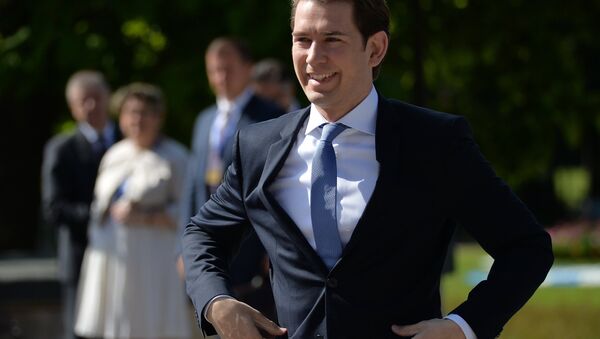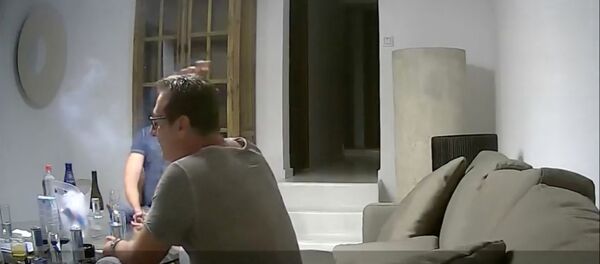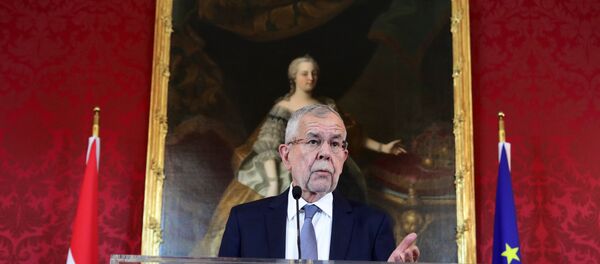On Tuesday, Austrian President Alexander Van der Bellen dismissed the country's government led by Kurz after a vote of no confidence passed by parliament. For several days, until the appointment of an interim cabinet, which will govern the country until the early elections in September, all resigned members of the government will continue to perform their duties, except for Kurz, whose duties are performed by interim Vice-Chancellor Hartwig Leger for a short time. The president expects to appoint an interim chancellor within a week.
The political crisis erupted in Austria earlier in May after then-leader of the OVP coalition partner, the Freedom Party of Austria (FPO), Heinz-Christian Strache was shown in a secret video pledging to fix public contracts for a Latvian woman posing as a Russian oligarch’s niece.
The scandal, however, has not prevented OVP from winning the European Parliament election in Austria with 34.6 percent of votes. The Social Democratic Party (SPO) came second with 23.9 percent of votes.
No Major Competitor For Kurz
Uli Brueckner, a professor of European studies at Stanford University in Berlin, told Sputnik that Kurz would have good chances to win the election because no political force was likely to challenge him.
"Given that there is currently no major competitor in the Austrian scene, it is very likely that in snap elections Kurz is going to be elected again or that he will win the majority in the parliament, to be more precise," Brueckner said.
READ MORE: Austria Scandal: Girl on Video With Strache is Actually… Bosnian — Report
At the same time Brueckner stressed that the political future of Kurz would depend on the party the OVP will have to deal with after the election.
"So it depends on who is going to be the junior partner and under what conditions. Because he [Kurz] certainly will not have enough votes to have a position like [Hungarian Prime Minister Viktor] Orban and then he needs a junior partner and he has to pay them and how he pays them remains to be seen," the expert said, adding the FPO was not happy with the way their members were withdrawn from the government after eruption of the scandal.
"One should expect that the 12-percent gap between the OVP and the SPO, which came second in the European Parliament election, is unlikely to be closed. Even in case of a good and strategically prepared campaign of the SPO and FPO," Hoell told Sputnik Deutschland.
At the same time the expert expressed doubts that Kurz would enter into a new coalition with the FPO, or with the SPO. He expects Kurz to focus on the election campaign in order to get 40 percent of votes, or even more, which would allow the OVP to create a coalition with a smaller party, like the he New Austria and Liberal Forum (NEOS), or The Greens – The Green Alternative.
Economic Aspect of Political Crisis
Answering a question on whether the scandal around Strache was aimed to challenge the Nord Stream 2 gas pipeline project, Brueckner said that the political crisis was more likely aimed at polarization of the political discourse.
"To me it sounds much more likely that it has to do with the general hype about ‘let’s polarize the debate.’ There is this camp that is committed to European integration and ‘we have to stand up and defend European values and principles’ and then there is this other camp, led by Orban, Strache and [Italian Deputy Prime Minister Matteo] Salvini and the others from the right populist camp," the expert said.
READ MORE: German Ex-Spy Chief: Mossad Behind Video Leak That Led to Austria Gov't Collapse
According to Hoell, the political crisis in Austria was unlikely to cause major economic problems in the country, which has been conducting liberal economic policy for years.
At the same time he added that collapse of the OVP-FPO coalition would slow down adoption of several bills in the economic sphere, for example, on decreasing the wage tax.
The views and opinions expressed by the speaker do not necessarily reflect those of Sputnik.




